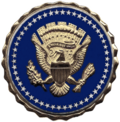
Father Aloysius H. Schmitt was a Roman Catholic priest at the Archdiocese of Dubuque, who served as a chaplain in the United States Navy at the beginning of World War II.
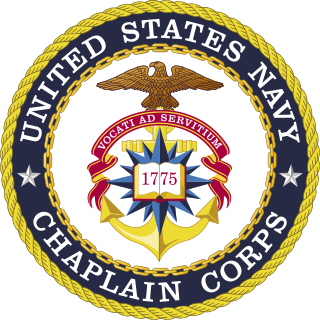
The United States Navy Chaplain Corps is the body of military chaplains of the United States Navy who are commissioned naval officers. Their principal purpose is "to promote the spiritual, religious, moral, and personal well-being of the members of the Department of the Navy", which includes the Navy and the United States Marine Corps. Additionally, the Chaplain Corps provides chaplains to the United States Coast Guard.

Barry Clayton Black is the 62nd chaplain of the United States Senate. He began serving as Senate chaplain on June 27, 2003, becoming the first African American and first Seventh-day Adventist to hold the office.

William Banks Caperton was an admiral of the United States Navy. He held major posts ashore and afloat, chief of which were commanding the naval forces intervening in Haiti (1915–16) and Santo Domingo (1916), and Commander-in-Chief, Pacific Fleet, from July 28, 1916, to April 30, 1919. He served actively until November 12, 1921.

Samuel Perry "Powhatan" Carter was a United States naval officer who served in the Union Army as a brigadier general of volunteers during the American Civil War and became a rear admiral in the postwar United States Navy. He received a nomination for appointment to the grade of brevet major general on January 13, 1866, two days before he was mustered out of the volunteers, to rank from the omnibus date of March 13, 1865. The nomination was confirmed by the United States Senate on March 12, 1866. He was the first and thus far only United States officer to have been commissioned both a general officer and a Naval flag officer.
Hispanics in the United States Naval Academy account for the largest minority group in the institution. According to the academy, the Class of 2009 includes 271 (22.2%) minority midshipmen. Out of these 271 midshipmen, 115 are of Hispanic heritage. In 2004, of the total of 736 female midshipmen, 74 (10%) of them were of Hispanic descent.
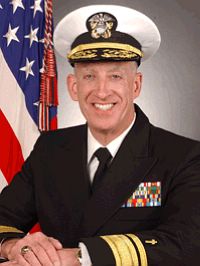
Louis V. Iasiello, OFM, USN is a Catholic priest and retired US Navy officer who served as the 23rd Chief of Chaplains of the United States Navy from 2003 to 2006.
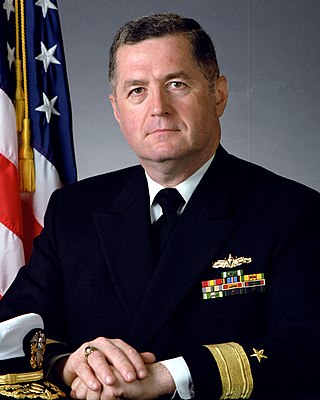
James Joseph Carey is a retired American Rear Admiral, United States Navy served from 1962 to 1994, born and raised in Berlin, Green Lake County, Wisconsin.
Hispanics in the United States Navy can trace their tradition of naval military service to men such as Lieutenant Jordi Farragut Mesquida, who served in the American Revolution. Hispanics, such as Seaman Philip Bazaar and Seaman John Ortega, have distinguished themselves in combat and have been awarded the Medal of Honor, the highest military decoration of the United States. Hispanics have also reached the top ranks of the navy, serving their country in sensitive leadership positions on domestic and foreign shores. Among those who have reached the highest ranks in the navy are Commodore Uriah Phillips Levy, of Sephardic and Ashkenazic Jewish descent, who participated in the War of 1812 as an assistant Sailing master; Admiral David Glasgow Farragut, for whom the rank of admiral in the U.S. Navy was created during the American Civil War; and Admiral Horacio Rivero, who led the navy during the Cuban Missile Crisis.
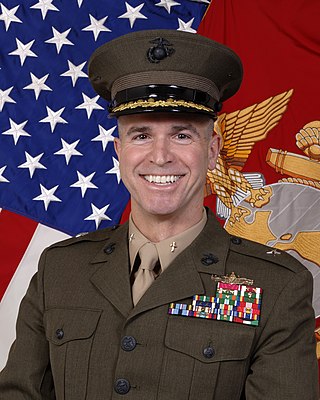
Rear Admiral Alan T. Baker, USN, is a retired American Navy officer who served as the 16th Chaplain of the United States Marine Corps from 2006 to 2009. Chaplain Baker was the first graduate of the United States Naval Academy and former Surface Warfare Officer to serve as a Chaplain Corps Flag Officer. Following his military career, Baker served as Directional Leader at Menlo Park Presbyterian Church, a 4,000-member, multi-campus church in the San Francisco Bay Area, from 2010 to 2012. He is currently principal of Strategic Foundations where he teaches, coaches and catalyzes organizations valuing the intersection of faith, learning and leadership.
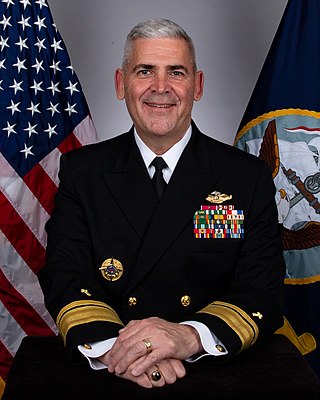
The Chief of Chaplains of the United States Navy (CHC) is the highest-ranking military chaplain in the United States Navy and head of the United States Navy Chaplain Corps. As part of the Office of the Chief of Naval Operations and Department of the Navy, the CHC is dual-hatted as the Director of Religious Ministries (N097) under OPNAV. In these capacities, the CHC is the principal advisor to the secretary of the Navy, the chief of naval operations and, where appropriate, the commandant of the Marine Corps and commandant of the Coast Guard "on all matters pertaining to religion within the Navy, United States Marine Corps, and United States Coast Guard." For administrative and personnel matters, the CHC reports to the chief of naval personnel.

Margaret Grun Kibben is an American Presbyterian minister who is the chaplain of the United States House of Representatives. She served as the 26th Chief of Chaplains of the United States Navy from 2014 to 2018; she was formerly the 18th Chaplain of the United States Marine Corps (CHMC) and the Deputy Chief of Chaplains of the United States Navy from 2010 to 2014. Kibben was the first woman to hold each of these positions.
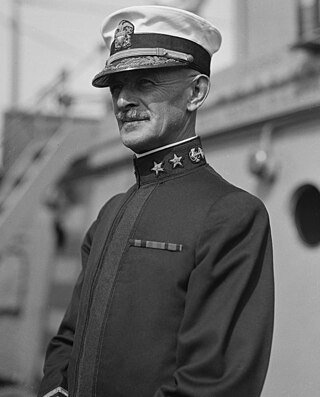
Rear Admiral Spencer Shepard Wood was a United States Navy officer. His career included service in the Spanish–American War and World War I, command of battleships and cruisers, and duty as an aide to a number of senior naval leaders.

Rear Admiral Frederick W. Rodgers was an officer in the United States Navy. He fought in the American Civil War and rose to be the last commander of the Asiatic Squadron. He was a grandson of U.S. Navy Commodore Matthew C. Perry.

Ross Henry Trower was a rear admiral and Chief of Chaplains of the United States Navy.

Gregory N. Todd is a United States Navy rear admiral and chaplain who serves as the 28th Chief of Chaplains of the United States Navy. He previously served as the 20th Chaplain of the Marine Corps. He also served for four years as the tenth Chaplain of the Coast Guard. Over a thirty-two year career, he has served in a variety of Navy, Marine Corps, and Coast Guard assignments, including deployments to Iraq and Afghanistan and chaplaincy work at Ground Zero in the wake of the September 11 attacks. He is a Lutheran.
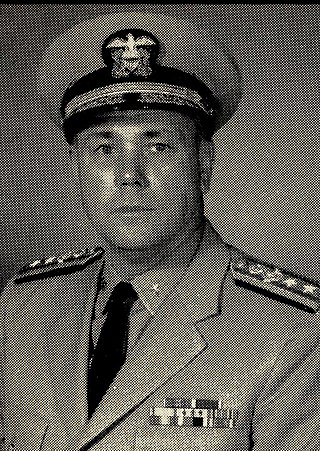
James Woodrow Kelly was a rear admiral in the United States Navy. He was Chief of Chaplains of the United States Navy from July 1965 to July 1970. He is an alumnus of Ouachita Baptist University and Southern Baptist Theological Seminary.

RDML Stephen Frederick Williamson is a United States Naval officer. In 2015, Secretary of Defense Ash Carter announced that President Barack Obama had nominated Capt. Stephen F. Williamson for the rank of Rear admiral.

Robert DuBois Workman was the U.S. Navy chief of chaplains during most of World War II from 1937 to 1945 and oversaw an increase of chaplains from less than 90 to more than 2800. He was of the Presbyterian faith. Workman was the first Chief of Chaplains to be promoted to rear admiral while still on active duty.

Howard Hartwell James Benson was a highly decorated officer in the United States Navy with the rank of Commodore. A son of Chief of Naval Operations, Admiral William S. Benson, he distinguished himself as commanding officer of the destroyer USS Roe during World War I and received the Navy Cross, the U.S. Navy's second-highest decoration awarded for valor in combat.


